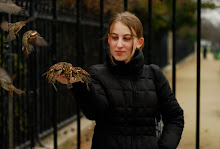I sometimes feel that the ability to think is no less important in my life than the ability to breathe. It is my greatest asset and my greatest obstacle, the thing that sustains me while simultaneously destroying me. It allows me to rethink the past and imagine the future, but it can just as easily contort them both in the worst way possible.
I get a thrill from complex thought unlike any other; when I begin to mull over something I feel strongly about, it is as if, after a long, dark winter, the curtains are being thrown open to reveal sunshine and brilliant flora. Despite the literary orientation of thought shared by most of my family, I am just as interested in discussions of politics, religion, and scientific innovations as in those about books, films, and works of art. Not to say that I am an expert in any of these fields (as I most certainly am not), but I find that informing myself about the thoughts and interests of others, and discovering the ways in which people structure their lives, is incredibly fascinating. I suppose that it all comes down to an interest in human psychology. I choose to avoid the realms of black and white, preferring to dwell in unknown territories, avoiding judgment as much as possible. My research has led me to believe that the word "agnostic" defines me in basically every aspect of my existence. And, to be clear, here are the sorts of definitions to which I am referring:
AGNOSTICISM |agˈnästəˌsizəm|
noun
- The theory that the ultimate problems of philosophy and religion are insoluble (http://www.willdurant.com/glossary.htm)
- The disbelief in any claims of ultimate knowledge (http://wordnetweb.princeton.edu/perl/webwn?s=agnosticism)
And here is exactly the kind of (rather typical, might I add) definition that I find to be biased, overly general, and absolutely patronizing:
- A suspension of belief in gods and theism, especially of named gods, arguing generally a lack of proof, whether by reason or evidence. Stopping short of atheism, it is a convenient position for both philosophers and laymen, especially where persecution is a threat. The term was introduced by the Darwinian evolutionist, Thomas Henry Huxley in the 19th C. (http://www.grazian-archive.com/quantavolution/Encyclopedia/encqnt4.htm)
Yes, of COURSE - I choose to remain open-minded to a variety of viewpoints because I am lazy and it happens to be "convenient." Or perhaps I am simply afraid of taking sides, because, God forbid, I might offend somebody!
If I were afraid of being judged, it would probably be simpler just to pick a side and stick with it, wouldn't it? At least that way I would have a large group of people to defend my viewpoint! Instead, I prefer to avoid labels such as 'good' and 'evil', 'fact' and 'fiction', 'right' and 'wrong'. I treat my life like a legal case - all sides on all issues are constantly presenting evidence, and I give greater credence to the side that I feel has formed a better argument. However, this does not mean that I completely discount the argument presented by the other side, because (I assume) there will never be a time when all the evidence will have been presented. Either I will die without ever finding out the truth, or the truth will reveal itself eventually.
I am just as opposed to gnostic atheism as I am to gnostic theism. I do not believe in the concept of "knowing for sure, because The Bible/science/my parents/my society told me so." All of these things have much to offer, but none of them should be taken as a given. They are all unstable, their messages changing over time and in different contexts, making them incapable of providing a complete, inarguable answer to anything.
It's funny, this is not really what I meant to write about. I wanted to talk about the effect of the books I've been reading (
Madame Bovary), the television shows (
Six Feet Under) and films (
Psycho,
Farewell) that I've been watching, and the classes that I've been taking (a million varieties of French, Russian Themes in World Cinema, and a silly-but-probably-amusing-and-also-requirement-fulfilling My Body, My Health class) on my thought processes. I love the song "Little Boxes," but I do not necessarily believe that the people who go to university are being put in boxes, little boxes all the same. The necessity of fitting the mold began long before university; I haven't found a box to contain me yet, so I don't think that higher education will change that.
Perhaps I am still a sheep, just of the sort that tries to stand out by bleating in a slightly different pitch than the others. Nonetheless, being a member of a flock doesn't change the status of my individuality - even sheep (as long as they haven't been cloned) aren't all identical!
And on that note (of clumsily-stated platitudes), I shall bid you good night.























































